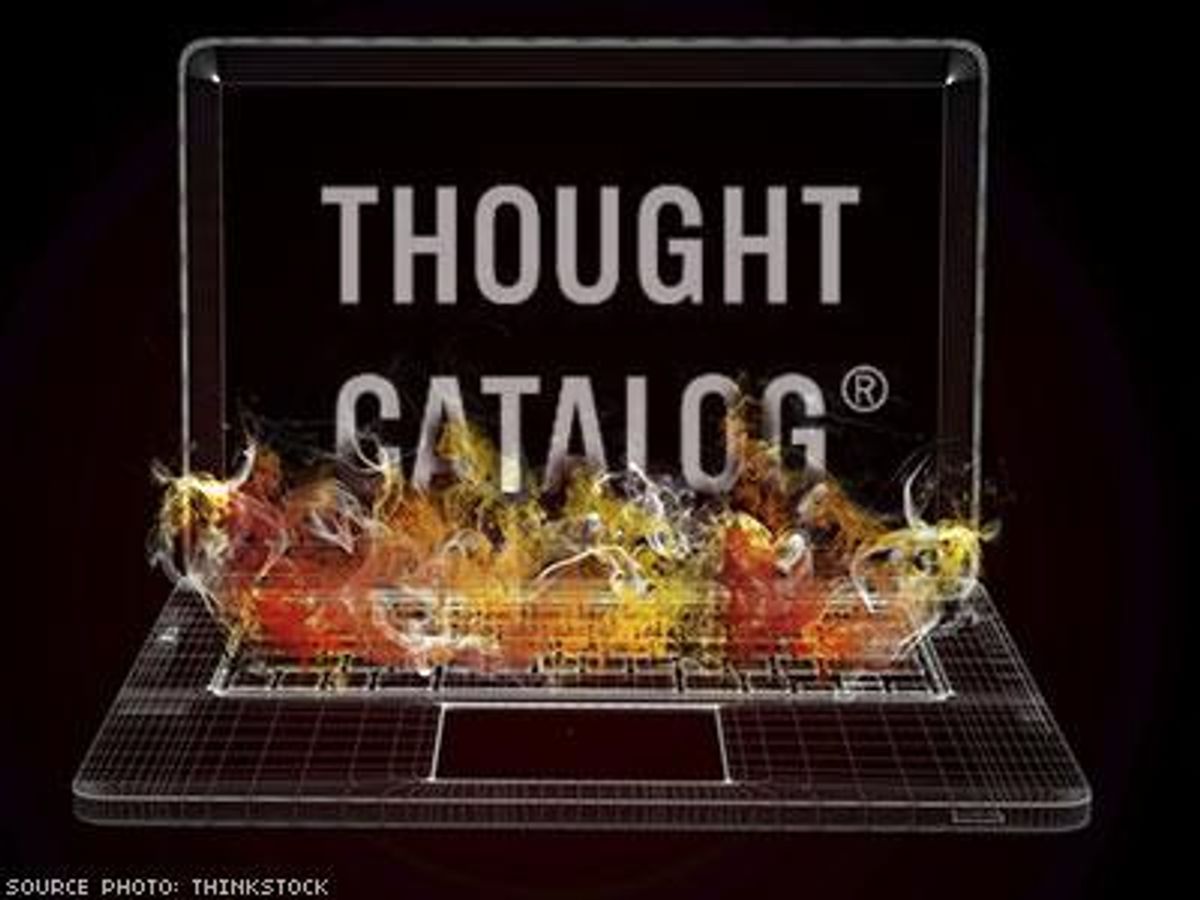On September 9, 2013, Thought Catalog founder and publisher Chris Lavergne spoke to me on the phone. Days earlier, I'd written a farewell essay to the site in response to Thought Catalog publishing a transphobic essay by Jim Goad, author of the book The Redneck Manifesto. Goad's essay, titled "Dangerously Sensitive," compared Chelsea Manning -- who had just come out as transgender a month earlier -- to Nidal Hasan, the man who slaughtered troops at Fort Hood.
Goad's thesis wasn't that Manning's leak of government documents put people in harm's way, and he didn't draw some sort of metaphorical link between Hasan and Manning. Instead he focused on Manning's existence as a transgender woman as the trait that makes her comparable to the murderer of 12 innocent people.
"By the way, his name is Bradley Manning, and he's a guy," Goad wrote. "To claim he's suddenly a chick is to deny biological reality." Earlier in the piece, Goad called for the banishment of women from the armed forces, writing, "If I had my druthers, I'd bring all the boys -- and they'd all be boys, meaning no girls, and no boys who suddenly decide that they're girls -- home to guard the true national-security threat, the one along the Mexican border."
Two months earlier, Goad lamented the degendering of language in "Spaying the Queen's English." The essay, like much of Goad's work, comes off as nothing short of xenophobic. For some unknown reason, Goad dragged trans people into the conversation, calling them "self-mutilating freaks."
Goad's views are reprehensible, and I was forced to weigh whether or not I felt comfortable having my writing appear alongside his. I made the decision to leave the site and wrote what was supposed to be one final post, explaining that decision. I wasn't calling for the erasure of the Jim Goads of the world, only my place alongside them.
Goad and I struck up a conversation in the days that followed. Maybe he didn't actually believe the things he was writing. Maybe he simply wrote for the shock value. There was only one way to find out, and it was through him.
After more than a dozen lengthy emails, in which we both laid out our views in favor of and against the existence of transgender individuals, I obtained Goad's permission to publish the dialogue on my blog. Shortly thereafter, I received an email from Thought Catalog producer Chrissy Stockton asking if the website could syndicate that post. Seeing as I believed it to be an interesting and educational work, I gave them permission, so long as the author was listed as Thought Catalog and not me. After all, I'd decided to move on.
The exchange was published and quickly went viral. It was then that I received my first email from Chris Lavergne, in which he thanked me for the content I had produced and expressed interest in trying to lure me back to the site. I agreed to a phone call.
In my conversations with Lavergne, he struck me as someone who in no way endorsed Goad's views but felt obligated to print them. "All thinking is relevant," says the company's slogan. Having spent a good deal of time considering the pros and cons of producing more content for the site, I switched my position, agreeing to submit content with the goal of providing education on trans issues. After all, the only way to combat the ignorance and misinformation spread by Goad was to make resources available to those looking to question his views.
In all, Thought Catalog published 38 essays of mine. Additionally, it published my first book, available both as an e-book and in audio format. As recently as last month, I'd still contribute the occasional essay; often they were pieces that didn't quite fit anywhere else.
Last week Thought Catalog published a number of wildly offensive essays. The first, a transphobic rant by Vice cofounder Gavin McInnes titled "Transphobia Is Perfectly Normal," featured lines like "To justify trannies is to allow mentally ill people to mutilate themselves" and "They are mentally ill gays who need help, and that help doesn't include being maimed by physicians."
The second, "Ferguson, Missouri, Looks Like a Rap Video," was written by Anthony Rogers and starts off by accusing Michael Brown, a teen gunned down by police, of "doing hood rat shit with his friends." Rogers goes on to play on racist stereotypes, pointing to Ferguson's black population as looting the town's supply of "Jordans, rims, and weaves."
McInnes's piece struck me as Goad -- who has since been offered a permanent job at Thought Catalog as a contributing producer -- on steroids. Immediately, I sent Lavergne an email, seeing if it was possible that McInnes's essay was published by mistake. The violent, graphic piece drips with hate and bigotry. "We see there are no old trannies," McInnes writes. "They die of drug overdoses and suicide way before they're 40 and nobody notices because nobody knows them."
That same morning, Rooster, the New York ad agency McInnes cofounded in 2010, published a tribute to Robin Williams, who took his life the day before. "If there are problems that you experience that may be too much to bear, remember that there is always someone waiting on the line to help you," the blog reads before linking to the National Suicide Prevention Hotline website. Many, including myself, found it odd that as the company made a point to address issues like depression and suicide, its cofounder was laughing about how there are no "old trannies."
On Friday, Rooster asked McInnes to take a leave of absence, telling AdWeek, "Gavin's views are his own and do not represent those of the company or its members. We are extremely disappointed with his actions and have asked that he take a leave of absence while we determine the most appropriate course of action."
Thought Catalog, on the other hand, has yet to publicly address McInnes's essay, though it has released a new community moderation feature, which will place warnings on essays reported to be of a hateful or abusive nature.
In the wake of the "Ferguson, Missouri, Looks Like a Rap Video" post, Lavergne told the Nieman Journalism Lab in an email that the post was not screened by a human prior to publication (though that leaves questions as to how images and videos were placed in the post) and that Thought Catalog would continue to publish abusive content, though it would no longer tweet it. Additionally, Lavergne frames Thought Catalog as a place where anyone can be published, telling the Nieman Lab that all one needs to do in order to be published is to email the site.
In late March, the site updated its "About" page to include a Frequently Asked Questions section. "We're an open platform and try not to filter any of the posts," reads one of the responses, though a separate question does state that "operational limitations often lead to submissions never making it to the site." Apparently, "all thinking is relevant" except for the pieces that aren't.
As Thought Catalog seems to be framing itself less as a publisher and more as an open platform where (virtually) anyone can publish whatever they want, I and more than 50 others have formally asked that Thought Catalog remove the work we've contributed to the site. Nearly a week later, and my complete archive of work can still be found on Thought Catalog, and my email to management has gone unanswered.
As I wrote last week, I believe McInnes's post may very well be the most transphobic piece of writing to have ever been published. If Thought Catalog deems that bit of writing "relevant," then so be it. I simply want my writing removed, no longer forced to sit side by side with the likes of Goad and McInnes. It's time to completely and permanently cut ties with the site, and that starts with it removing my content from the site, along with that of anyone else who has made a similar request. That starts with it leaving my name out of the keyword list when publishing these types of articles, which currently feature the words "creepy" and "mental illness" alongside my name.
While all thinking may be relevant, I wish to no longer associate my writing, my thoughts, and my work with a site that publishes the work of men who laugh about trans suicides, call people like me "men," and so on. I am done debating my own right to exist, and I ask that you no longer force me to remain associated with those who see me as a "mentally ill gay."
PARKER MARIE MOLLOY is the founder of Park That Carand works as a freelance writer. She has contributed writing to The New York Times, Rolling Stone, The Daily Beast, Slate, Salon, The Huffington Post, and Talking Points Memo as well as The Advocate. Additionally, she regularly contributes opinion entries to RedEye Chicago, and writes a weekly column at HelloGiggles. She is a 2014 Trans 100 honoree, and was named to Windy City Times' "30 Under 30" list. Follow her on Twitter @ParkerMolloy.


















































































